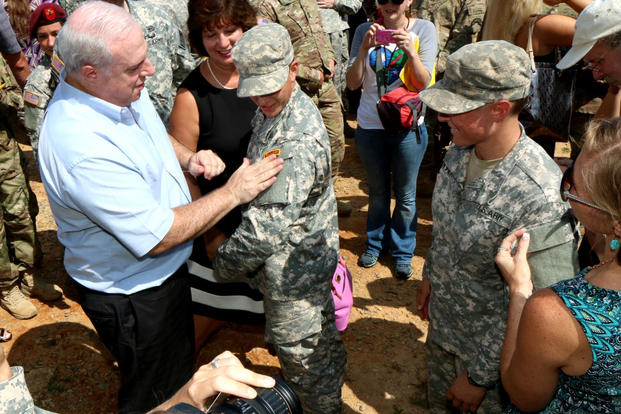In 2016, female soldiers will have the chance to serve in any infantry company, the 75th Ranger Regiment and on Special Forces teams -- all jobs that were previously closed to women.
Defense Secretary Ashton Carter's historic announcement on Thursday that all military combat-arms jobs will be open to women comes months after the first three female Army officers graduated from Ranger School, a grueling infantry leadership course opened only to males since it was founded in 1952.
Capt. Kristen Griest, a 26-year-old military police officer and 1st Lt. Shaye Haver, a 26-year-old AH-64 Apache helicopter pilot earned their Ranger Tabs in August.
Maj. Lisa A. Jaster, a 37-year-old combat engineer with the U.S. Army Reserve, graduated from the 62-day course in October. The trio were part of an original group of 19 females who volunteered to take part in the first-ever Ranger School class in April.
Carter's ruling finalizes the February 2012 directive made by then-Defense Secretary Leon Panetta that all the services develop plans to open all direct-action combat jobs by January 2016.
The move puts an end to the 1994 Direct Ground Combat Definition and Assignment Rule, the primary policy that restricted female members of the U.S. military from serving in units below brigade level whose primary mission is to engage in direct combat on the ground.
"There will be no exceptions. This means that as long as they qualify and meet the standards, women will now be able to contribute to our mission in ways they never could before," Carter said at a Pentagon briefing.
"They'll be allowed drive tanks fire mortars and lead infantry soldiers into combat," he said. "They will be able to serve as Army Rangers and Green Berets, Navy Seals, Marine Corps Infantry, Air Force Parajumpers, and everything else that previously was only open to men."
As of Jan. 1, women in the enlisted, commissioned officer and warrant officer ranks will be able to serve in all 11 series (infantry), 13F (fire Support Specialist), all 18 series (Special Forces) and all 19 series (armor and cavalry) military occupational specialties, or MOSs.
All the services conducted studies to study the possible effects opening direct-combat jobs to women.
Army Training and Doctrine Command conducted the U.S. Army Gender Integration Study, which considered institutional and cultural factors associated with the move. Army Medical Command conducted the U.S. Army Research Institute of Environmental Medicine task assessment, which considered physical factors.
On June 21, Frank Kendall, the undersecretary of defense for acquisition, technology, and logistics issued guidance to the secretaries of the military departments regarding combat equipment for female military members, according to information released by the Pentagon.
The guidance directed all services to take immediate steps to ensure that combat equipment provided to female service members is properly designed and fitted to accommodate their requirements and meets required standards for wear and survivability.
On Sept. 30, the services submitted their final recommendations for those occupations and positions that remained closed to women to Carter along with certifications of their occupational standards.
The Marine Corps requested two broad exceptions consisting of 48,779 positions in the active and Reserve components of the Corps and Navy. One exception was for specific military occupational specialties -- infantry officer, infantry weapons officer, rifleman, light armored vehicle crewman, reconnaissance man, machine gunner, mortarman, infantry assaultman, antitank missileman, infantry squad leader, infantry unit leader, special operations officer, critical skills operator and fire support man.
The other exception was to restrict women from serving in types of units -- infantry regiments and below, reconnaissance battalions, light armored reconnaissance battalions, force reconnaissance battalions, Marine raider companies and combat engineer/assault companies.
Secretary of the Navy Ray Mabus did not approve the Marine Corps' requests but did forward them for exceptions to Carter for his review.
"After careful review and consultation with key leaders, to include the Chairman of the Joint Chiefs of Staff, the Secretary of Defense decided to open all remaining occupations and positions to women with no exceptions," according to December 3 background briefing document.
--Matthew Cox can be reached at matthew.cox@military.com.





























